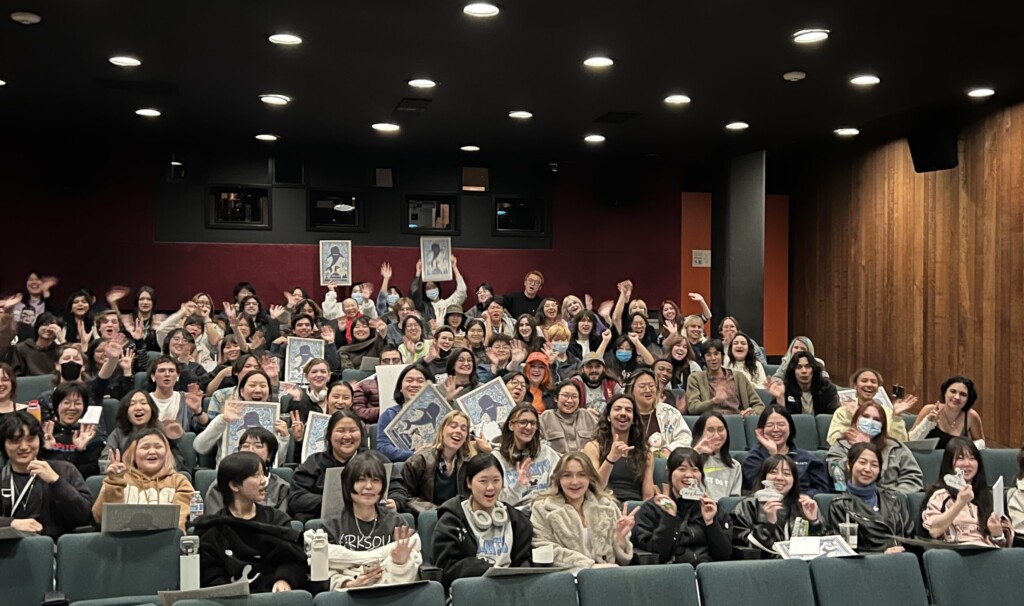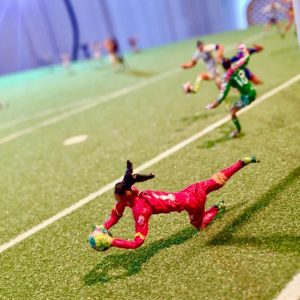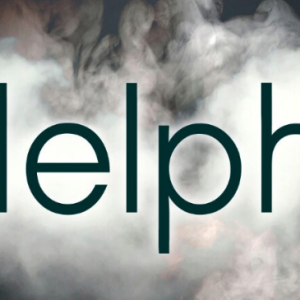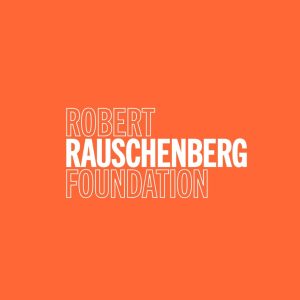Character Animation’s fall semester night talks closed out on a high note on Dec. 6, with Moana 2 directors David Derrick Jr. (Film/Video 04) and Jason Hand (Film/Video 02) dropping by the Bijou to present a special screening of the film.
Originally conceived as a Disney+ series, Moana 2 follows the heroine three years after the events of the first film as she embarks on a new journey throughout the Pacific. Derrick Jr. was initially tapped as a director for the sequel, and brought Hand into the directing fold with Dana Ledoux Miller. Their combined efforts resulted in a sequel that made waves at the box office on Thanksgiving weekend, and recently nabbed a Golden Globe nomination for Best Motion Picture – Animated.
Before students poured into the Bijou, 24700 caught up with Hand and Derrick Jr. to discuss the film and their time at the Institute.
Interview has been edited for length and clarity.
You both worked as story artists for the first Moana. In an interview on Laughing Place, you mentioned getting a “masterclass” from Ron Clements, John Musker (Film/Video 77), and Don Hall (Film/Video BFA 95), the last two also being CalArts alumni.
Derrick Jr.: “We would add [Bolt and Big Hero 6 director] Chris Williams to that list. They mentored all of us. When we started to continue Moana’s story, we met with Ron and John to kind of get their blessing going forward, and yeah, we love all of them.”
Hand: “Don Hall was a teacher of mine here at CalArts. He was my third year story teacher, and then I worked with him on Big Hero 6 and eventually on Moana. Working with Ron and John—”
Derrick Jr.: “Who are legends.”
Hand: “—is incredible. The three of them are hugely influential to this day on me.”
What cues did you take from them as you took the reigns for Moana 2, and how did you expand on them to leave your own stamp on the film?
Derrick Jr.: “Well, we promised Ron that Pua would go on the voyage, so that. And now that people have seen the film, we can say what John said. ‘Have Maui pull an island up from the sea.’ That’s part of the legends of Maui and something we always wanted to do in the first film, and honestly we could just never fit it in. I was very proud we found a way to show that, and have that in the film.”
Hand: “And I think we really just expanded upon the relationship between Moana and Maui, and that was part of it, what Dave was just talking about. Really, just finding a deeper connection between those—”
Derrick Jr.: “—two characters was really important to us.”
Hand: “And that was something that Chris Williams and Don Hall really established.”
Derrick Jr.: “Absolutely, yeah. Knowing that it was such a powerful force between those characters, we really wanted to continue forward with that.”
How did your time at CalArts inform your creative process?
Derrick Jr.: “Everything. There’s something incredible about having shared the space in this building, having finished multiple films on your own, that has forever connected us to the community of artists going out. It was one of the reasons why we wanted to work with each other. We both knew each other from CalArts. So there is a camaraderie that comes from this place.”
Hand: “I think it’s developing your own knowledge of your own voice, or what artistically is interesting to you, because when you make a film here at CalArts, or you do any of your projects, it’s up to you to choose. You can, just by looking at what you choose, find out a lot about yourself. And that continues to develop after you leave CalArts, for sure, but I think I became the most in touch with it while I was here.”
A major theme of this sequel is the continuation of self discovery, that you never stop choosing who you are. What would you tell current students as they continue to grow into their artistry (and themselves)?
Derrick Jr.: “I think that the only thing you can control is the work that you do, the art that you make. So whether success comes or it doesn’t, put all your passion into your artwork. I believe good things will come from that.”
Hand: “Yeah. I mean, and it sounds a little cheesy to say this, but I’ll say it because I believe it: Moana is a character who never gives up, and there’s something so powerful about that. I think that’s what makes her admirable, a person that people look up to. She’s aspirational, and I find joy in thinking that if we can take anything from this—that idea of doing it for the right reasons, and never giving up—good things can happen from that, and whether they’re expected or unexpected, is something that I think is powerful.
You worked with the Oceanic Cultural Trust and Polynesian Voyaging Society while conducting research for the film. Were there any moments during this process that stand out to you?
Hand: “I think one that every single one of our consultants talked about is this idea of ‘the ocean connects us.’ That goes back to the first film as well, and we always used that as a jumping-off point in our story. But we never actually saw Moana connected to any other people, any other of the cultures of the Pacific, so that was a huge nugget that we started with on this. And then, it also led to the character Simea as well, that connection to her own island being so strong, and that idea of when she leaves, that she’s connected back to her island through the ocean, so that’s a really powerful one.
Derrick Jr.: “For me—and this is just personal, too—it’s all about ancestors. It’s about connecting to something bigger than you are, and a chain that you are also continuing. The character Simea, that name is actually one of the names of my ancestors and also almost the name of my daughter. The relationship you see on film with Moana and Simea is actually the relationship I saw with my siblings. It’s amazing, in our own lives, through research, we bring in things, but also our lived experience becomes part of the stories we tell.”
Anything you’d like to share with CalArts students?
Hand: “I would say that my time here at CalArts was foundational for me. It really was. I found myself frustrated a lot of the time, but I was frustrated at myself. Often I’d feel like I wanted to be further along in my career, better at what I did, and I still kind of feel like that, but that’s the journey—that’s the struggle we’re always part of. You just kind of learn to live with that, and it’s okay. It actually drives you.”
Derrick Jr.: “Treasure the time you have here. It’s an incredibly special time in an incredibly special place. Soak it all up. You never know where it’s gonna lead.”



